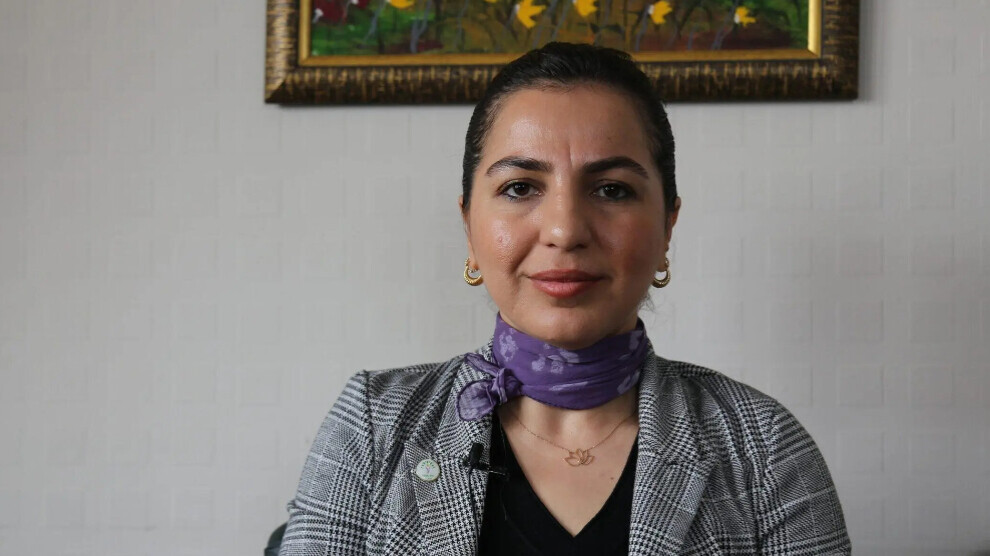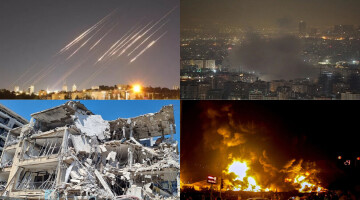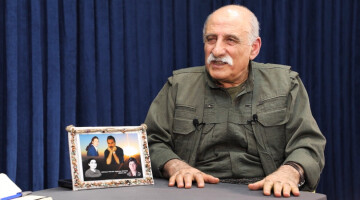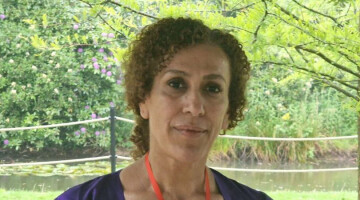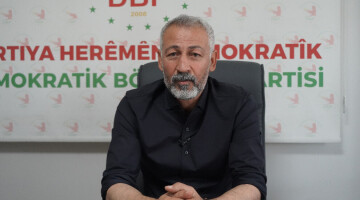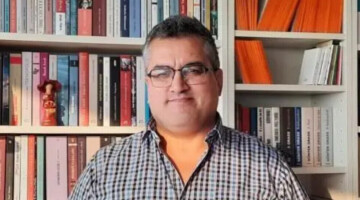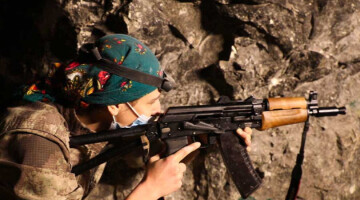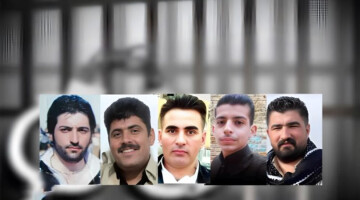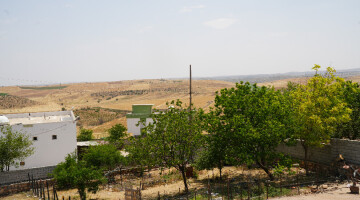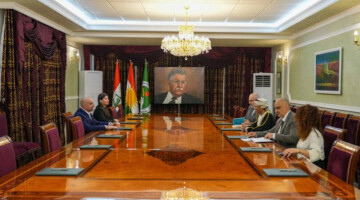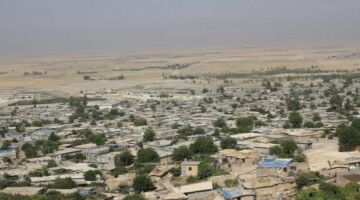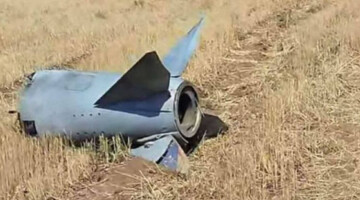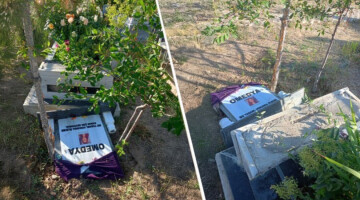The province of Bitlis in northern Kurdistan is characterised by resistance, but also by repression, persecution and attacks by the Turkish army. Here, the Turkish state is trying with all its might to enforce its policy of assimilation and the destruction of all resistance through particular aggression.
Curfews, political and military operations, torture and detentions have been the order of the day in the districts of Hizan and Tatvan for around five months. During this period, hundreds of people have been detained and dozens imprisoned.
On 28 November, 110 people, including women and children, were detained during house searches in the districts of Hizan and Tatvan and the neighbouring province of Van. More than 50 of the 110 people brought before the magistrate were remanded in custody. Those arrested were ill-treated at the Bitlis police station.
A curfew was imposed on the villages of Hûzeran, Akûnis, Govan, Lanîlan, Xûlepûr, Kekulan, Sûreh, Pertawan, Kuran and Mezra Pisyan in the district of Hizan on 2 July, after which military operations began. A curfew was also imposed on the village of Peyîndas (Söğütlü) near Tatvan, which was surrounded by soldiers and village guards on 10 August. During the operations, five villagers from both districts were detained and many detainees were tortured. Forest areas in Hizan and Tatvan were also destroyed to establish military outposts.
HEDEP member of parliament Semra Çağlar Gökalp, who represents the Bitlis province in the Turkish parliament, spoke to ANF about the situation in the region. She sees the awareness and deep connection of the Bitlis region with the Kurdish identity as one of the reasons why the Turkish state is attacking there so massively. "Throughout the history of the republic, Bitlis has been one of the centres of the implementation of the policy of oppression, denial, annihilation and assimilation against the Kurdish people. For this reason, the Turkish state does not allow the development of Kurdish national and political consciousness in Bitlis. The hundred-year history of the Republic of Turkey has proven that the Kurdish question cannot be solved through war policy. Unfortunately, the government still insists on seeing its political future in the politics of war. This insistence leads to the continuation of oppression and persecution in Bitlis and almost everywhere in Kurdistan. The law still does not apply anywhere in Kurdistan. This has been the case throughout the history of the republic. Perhaps it can be said that a special law of war is applied here. From time to time, it is described as enemy law, but there are always practices that go beyond that. The attacks by the state on the Garzan cemetery, for example, cannot be categorised in any way."
The attack on Garzan was a crime committed by the Turkish state in December 2017 that transgresses all laws of war. At that time, the Garzan cemetery near the village of Oleka Jor in Bitlis province was the target of such an attack. The cemetery, which contained 267 dead bodies, was bulldozed, the remains of the dead were dug up and taken to the Forensic Medicine Institute in Istanbul. Some of them were then buried under pavements or in graves for people without relatives by the authorities. Some relatives are still fighting for the remains of their loved ones exhumed from the Garzan cemetery.
Gökalp described the situation of the people in the villages, especially in the summer months, as dramatic: "People are tortured as state forces go from village to village and carry out mass arrests, whether young or old, male or female, vandalise people's vineyards and gardens and cut down trees. The areas where villages are located are also the places where military security zones and curfews are most frequently declared. The villagers are no longer allowed to enter their pastures, they are not even allowed to go to their fields or leave the village. In such an environment, you can't talk about the safety of life and property. This is the life that the AKP government deems proper for the Kurds."
Gökalp spoke of a state of siege in Kurdistan that has lasted since 1925, stating: "The Takrir-i Sükûn law, the independence courts, the Eastern Reform Plan, the general inspections and the state of emergency all pursued the same goal. The administrative structures, endowed with extraordinary powers, implemented a policy of systematic assimilation and extermination as well as all kinds of oppression and violence. Today, this system is enforced through the policy of trustees. All these are typical practices of the colonial system. Unfortunately, the Kurdish people know them very well and have often experienced them first-hand. The Kemalist regime developed a policy based on the destruction of the Kurdish people, to get never revitalised. What the current regime is doing is not much different. Yes, denial was abandoned to a certain extent, this was the result of great sacrifices and struggles. However, the policy of eradication and assimilation continues intensively. During the implementation of the Eastern Reform Plan, thousands of people were massacred and driven into exile in the Bitlis region, and attempts were made to eradicate all traces of the Kurdish language and culture."
One of the aims of the repression is to expel the Kurdish population, the MP said and continued: "In Bitlis, soldiers storm the villages in the morning and detain 80-year-olds. The people are wanted to be driven off their land by making their centres of life uninhabitable. The aim is to bring livestock farming and agriculture to a standstill. The aim behind this is to destroy these economic resources of the people. Nature is being destroyed in the restricted military areas and security zones. This is a policy of systematic depopulation in question. The aim is to turn the region into a single military base by displacing the population. The village burnings of the 1990s are still fresh in the minds of the Kurdish people. We know this face of the state. Despite all the oppression and persecution, they could not drive us away from our land, and they will not be able to drive us away today. Our roots in this country are too deep for them to reach."
Gökalp pointed out that the situation in Bitlis shows the situation in the whole of Kurdistan and added: "People who get up every morning to go to their fields and look after their cattle, to earn a living in the place where they were born with their language, their culture, their identity and their will, are torn from their beds at the crack of dawn by the grimace of a hundred years of tyranny. A nation of millions is declared criminals by the state, marginalised with hate speech, assimilated by all possible methods and, if that is not possible, annihilated. But another life, another way, is possible."

